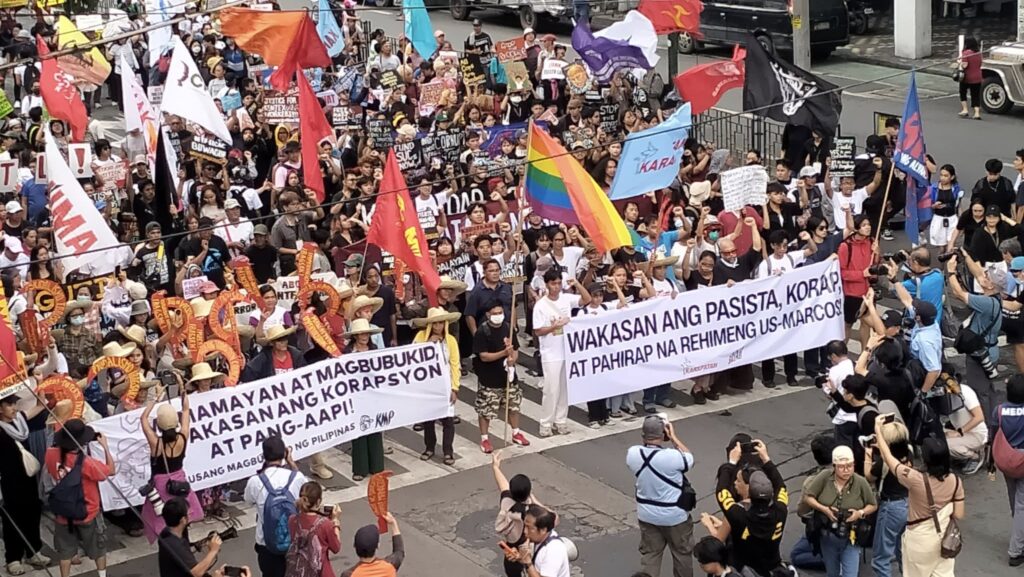📷Former Bayan Muna Partylist Rep. Eufemia C. Cullamat
Bayan Muna stands firmly against House Bill No. 10755, which proposes to extend the aggregate land lease period for foreign investors from 75 years to 99 years. This measure blatantly disregards the welfare of Filipino farmers, workers, indigenous peoples, and the broader interests of the Filipino people.
According to Bayan Muna Partylist former congresswoman Eufemia C. Cullamat this is a threat to Filipino farmers, agricultural reforms, and ancestral domains.
Cullamat said “Agricultural lands — including those awarded to agrarian reform beneficiaries — are essential for ensuring food security and the livelihoods of our farmers. Allowing foreign investors to lease these lands for up to 99 years undermines decades of efforts to provide land access to Filipino farmers. This is nothing less than a gateway to land grabbing and disenfranchisement.”
Equally alarming is the bill’s potential impact on ancestral domains. Indigenous communities who have long fought for the recognition of their ancestral lands under the Indigenous Peoples’ Rights Act (IPRA) are now at risk of being displaced or marginalized further. House Bill No. 755 fails to safeguard ancestral domains from being leased or exploited, leaving them vulnerable to foreign corporate interests.
“Ancestral lands are not just territories; they are sacred spaces deeply tied to the identity, culture, and survival of indigenous peoples. To extend leasing rights to foreign entities over these lands for 99 years is a direct assault on the rights of indigenous communities to self-determination and stewardship of their ancestral domains” added Cullamat.
Further, history has shown that when lands are controlled by foreign or corporate interests, it is the small farmers and indigenous peoples who suffer the most. They are displaced, silenced, and stripped of their rights to land ownership, sustainable livelihood, and cultural practices. This bill would exacerbate the already dire conditions of landlessness, poverty, and exploitation in the Philippines.
Cullamat emphasized that this bill will greatly affect IP communities mostly in Mindanao.“As of 2023, there are 47 approved Mineral Production and Sharing Agreements (MPSA) covering over 123,805 hectares of land in Mindanao. These agreements represent more than half of Mindanao’s total mining permits which majority of the operators are foreign companies.”
Additionally, At least 230 of the 447 approved mining applications are in ancestral territories, encroaching in at least 542,245 hectares of ancestral lands, which covers 72% of the 748,590 hectares by approved mining applications. The bill will certainly result to larger displacement and damage of the ancestral domain not only in Mindanao but in the whole country.
While proponents of the bill argue that it does not permit foreign ownership of land, the proposed provisions for prolonged leasing, subleasing, and using lease contracts as loan guarantees effectively grant foreign entities control over vast tracts of our land. This control is no different from ownership in practice.
The lack of clear demarcation between private and public lands, as well as the inclusion of agricultural and patrimonial properties, creates dangerous loopholes. Even ancestral lands protected under IPRA could be indirectly subjected to these exploitative provisions, endangering indigenous peoples’ rights and survival.
“It is clear that the bill prioritizes the interests of foreign investors over the needs of our farmers, workers, indigenous peoples, and local industries. How can we call this economic development when the very foundation of our agricultural sector — the Filipino farmer — and the cultural backbone of our indigenous communities are being eroded for foreign profits?” Cullamat added.
Instead of granting foreigners near-permanent control over our lands, Congress should focus on implementing genuine agrarian reform, respecting indigenous peoples’ rights, and pursuing national industrialization. These are the keys to self-reliant and inclusive growth, ensuring that the fruits of our land and resources benefit Filipinos, not foreign corporations.
Hence, we call to reject House Bill No. 10755 and any measure that threatens our sovereignty, farmers’ rights, indigenous peoples’ rights, and national development. We must protect our agricultural lands, patrimonial properties, and ancestral domains to ensure they serve the Filipino people for generations to come#




